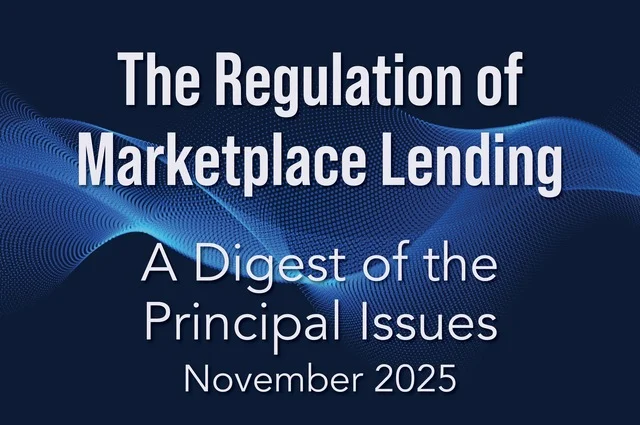Insights
On November 25, 2025, the federal banking agencies (agencies) adopted a final rule that implements in almost unchanged form all the changes described in our July 10, 2025, Client Alert titled “Federal Banking Agencies Propose Reduction in “Enhanced Supplementary Leverage Ratio” Requirements for US GSIBs and Corresponding Reductions in TLAC and LTD Requirements.”
On November 18, 2025, the Ninth Circuit Court of Appeals temporarily enjoined enforcement of California’s Climate-Related Financial Risk Act, Senate Bill 261 (SB 261) just as companies are preparing to meet the law’s first disclosure deadline on January 1, 2026. SB 261, which was challenged in court by the United States Chamber of Commerce (the Chamber) and other business groups, requires that certain United States-based entities with annual revenues over $500 million doing business in California publicly disclose their climate-related financial risks and mitigation measures.
Chapman wrote the book on the marketplace lending regulatory landscape that the entire industry has come to rely upon. First published in 2013, the 2025 update covers a vast array of topics including recent federal, state, and litigation developments and a new section on digital assets, highlighting blockchain, stablecoin legislation, and potential impacts on the marketplace lending industry. This edition reflects post-election regulatory shifts, ongoing true lender litigation, and new challenges for products such as Buy Now Pay Later and Earned Wage Access.
On November 10, 2025, the IRS issued Revenue Procedure 2025-31, providing formal guidance addressing how trusts that qualify as investment trusts under Treas. Reg. § 301.7701-4(c) and grantor trusts for Federal income tax purposes can engage in digital asset staking without jeopardizing their favorable tax treatment. This guidance clarifies the conditions under which staking activities may be conducted while maintaining classification as both an investment trust and a grantor trust. The procedure establishes a safe harbor with detailed structural and operational requirements for eligible trusts, providing greater certainty for trustees and beneficiaries navigating digital asset investments. In particular, the safe harbor provides sponsors of trusts operating as crypto asset exchange-traded products (“ETPs”) a grantor trust compliant path to timely meet redemption requests in circumstances when the “unstaking” of a staked digital asset takes longer than the trust’s normal T+1 settlement cycle for redemptions.
On November 10, 2025, the United States Court of Appeals for the Tenth Circuit issued the long-awaited decision on Colorado’s Depository Institutions Deregulation and Monetary Control Act of 1980 (DIDMCA) opt-out legislation. In 2023, Colorado enacted H.B. 23‑1229 to opt out of DIDMCA §§ 521–523. These provisions provide parity with national banks and allow state-chartered banks to charge interest as allowed in the state they are located and preempt conflicting state laws allowing exporting of those rates to other states. But Section 525 of DIDMCA allowed states to opt out of this federal preemption. Only Iowa and Puerto Rico have opted out until Colorado’s enactment which the state asserts would limit interest rate charges from out-of-state state-chartered banks to borrowers in Colorado. The law does not apply to national banks which may export their rates and fees nationwide without any state opt out rights.
The statute’s opt out provision is tied to loans made in the opt out state – which until now has not been interpreted by a court.
On September 17, 2025, the New York Department of Financial Services (the “NYDFS”) issued guidance to all New York Banking Organizations (“2025 Guidance”) recommending that they consider leveraging blockchain analytics tools to enhance their compliance programs and risk frameworks if they are engaged in, or contemplating engaging in, virtual currency-related activity (“VCRA”).1 This 2025 Guidance marks a significant expansion, as it now applies NYDFS blockchain analytics expectations to all New York Banking Organizations,2 not just BitLicense holders and limited purpose trust companies (together, “VCEs”). This reflects the regulator’s recognition of banks’ increasing involvement in and exposure to VCRA.
On September 4, 2025, the Securities and Exchange Commission (the “Commission”) released its Spring 2025 Unified Agenda of Regulatory and Deregulatory Actions (the “2025 Agenda”), which outlines the Commission’s upcoming planned regulatory actions. Chairman Atkins announced the 2025 Agenda by stating: “it is a new day at the [Commission] focus[ed] on supporting innovation, capital formation, market efficiency, and investor protection.”
Chapman welcomes partner Christian Brockman to our Corporate and Securities Department and Investment Management Group. A leader at the intersection of finance and technology, Christian brings a unique commercial perspective from his experience as general counsel to guide private fund sponsors and institutional investors through their most complex transactional and regulatory matters, with a particular focus on the digital asset and cryptocurrency ecosystem.
According to recent IRS guidance, Tax Credit Seekers Have Until September 30, 2025, to "Acquire" Vehicles through a Binding Written Contract and either a nominal downpayment or a trade-In, to obtain a Section 45W Clean Commercial Vehicle Tax Credit.
On August 6, 2025, the Securities and Exchange Commission's Division of Trading and Markets
(the “Division”) issued responses to Frequently Asked Questions (“FAQs”) regarding rule amendments to Rule 15c3-3a under the Securities Exchange Act of 1934 (the “Customer Protection Rule amendments”) related to the reserve calculations for clearing US Treasury securities (“Treasury Securities”). The Division’s FAQs provide guidance for broker-dealers as they prepare for the approaching compliance dates of December 31, 2026, and June 30, 2027, for mandatory central clearing of cash and repo transactions, respectively, in Treasury Securities.

- Topic: Caesars
3 matches.
- April/May 2016 (Originally Published January 22, 2016)Pratt's Journal of Bankruptcy Law
Pratt's Journal of Bankruptcy Law republished a Chapman Client Alert.
Retail bondholders recently filed two class action suits in the United States District Court for the Southern District of New York challenging exchange offers under the Trust Indenture Act.
- Client Alert
Out-of-court debt restructurings may face greater hurdles to success in light of two recent federal court decisions out of New York broadly expanding dissenting bondholders’ rights under the Trust Indenture Act.





